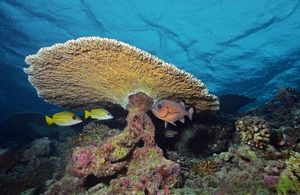More action needed to protect the world’s ocean, says Environment Secretary on World Wildlife Day
The Environment Secretary calls for countries to join together to halt and reverse the loss of nature and protect at least 30% of the world's ocean by 2030.

The UK is helping to protect and restore marine habitats such as coral reefs.
Countries around the globe must join together, raise ambition and act faster to protect and restore nature on both land and sea, Environment Secretary Thérèse Coffey has said on World Wildlife Day (3 March).
Following the historic agreement reached at the UN Biodiversity summit last year, the Environment Secretary is attending the Our Ocean conference where she will work with other countries to make this the decade we halt and reverse the loss of nature and protect at least 30% of the global ocean by 2030. She will also acknowledge the effectiveness of established tools such as CITES convention that celebrates 50 years of protecting endangered species today.
Building on commitments outlined in the Government’s Environmental Improvement Plan launched last month and progress to protect nature on land, the UK is this week announcing vital funding to boost marine conservation efforts worldwide, fight climate change, and support vulnerable coastal communities.
The UK has renewed support through its ambitious £500 million Blue Planet Fund to protect and restore important marine habitats such as mangroves, coral reefs and seagrasses that play a key role in the fight against climate change. This includes an additional £24 million to the Global Fund for Coral Reefs, and the UK becoming the first donor to the Blue Carbon Action Partnership, committing £4 million to support countries unlock and mobilise finance to protect and restore blue carbon ecosystems.
The Environment Secretary has also announced £45 million to the new ‘Blue Tech Superhighway’ project. From community-led fisheries management enabling local communities to set and monitor their own catches; new seawater farming systems working with species more resilient to warmer waters; through to pioneering approaches to reduce food waste, this investment will support small-scale fishers and aquaculture farmers improve their climate resilience, sustainability and incomes. The project will also encourage collaboration between countries across Asia and Africa to scale action.
This comes as the UK announced it will provide £1.5 million to the Asian Development Bank’s new Blue Pacific Finance Hub to support climate resilient, sustainable blue economies for Pacific Small Island Developing States including developing circular economies to reduce plastic waste and improved fisheries management.
The Environment Secretary, Thérèse Coffey said:
It is almost impossible to overstate the importance of stepping up our efforts to bolster the resilience of the marine environment and, in turn, the economies and communities that depend on it.
At the UN nature summit in Montreal, we made a commitment to manage our whole ocean sustainably and set a target to protect at least 30% of the world’s ocean by 2030. The UK is leading, co-leading, and supporting global coalitions of ambition to drive forward this mission, and I urge countries to come together to deliver coordinated, impactful action on the ground.
She also urged more countries to join forces to tackle the scourge of Illegal, Unreported and Unregulated (IUU) fishing, one of the most serious threats to the world’s ocean which equates to approximately 11-19% of reported global fisheries production and leads to losses of roughly $10-23.5 billion in value. IUU fishing undermines efforts to conserve fish stocks, damages marine ecosystems, impacts global food supply chains and threatens coastal communities whose livelihoods rely on sustainable fishing.
The UK, US and Canada launched the world’s first global alliance to tackle IUU fishing last year, with members sharing data and tools to monitor and crack down on this pervasive issue. This builds on progress under the UK-led Blue Belt Ocean Shield programme which uses innovative surveillance techniques to tackle illegal practices in over 4.3 million square kilometres of waters around the UK Overseas Territories.
Since its launch, the Alliance has grown to 16 members, with Norway, Iceland and Korea recently coming onboard. More members will sign up at the Our Ocean conference today, including the EU, Panama and New Zealand.
Thérèse Coffey said:
For too many communities, the threat of IUU fishing looms year after year, as they bear the brunt of the instability and violence that accompanies this serious, organised, transboundary crime.
For marine species, the impact can be devastating and this has a catastrophic effect on the lives of the hundreds of millions of people who depend on fisheries for their livelihoods.
So, we need to accelerate our efforts and scale up. That is a priority for us in the UK – something we are addressing by improving import controls, sharing more data on vessels, identifying those who profit from IUU fishing, and holding them to account.